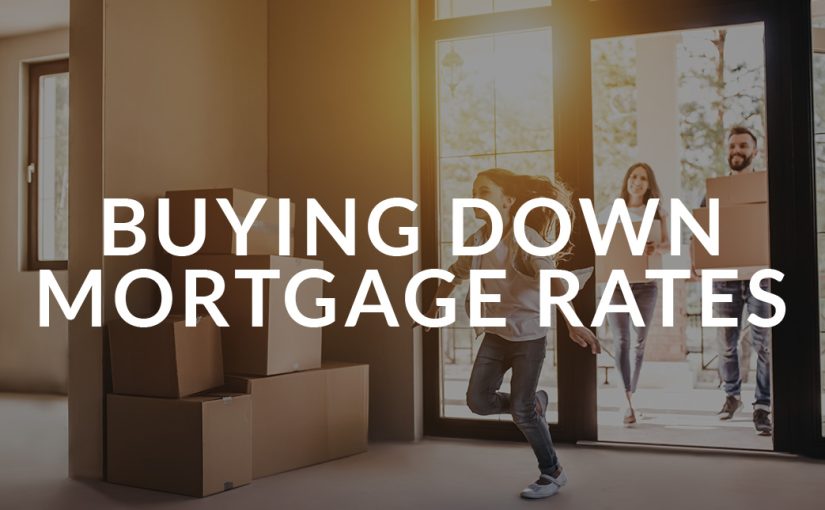Are you in the market for a new home? It’s an exciting time, filled with dreams of cozy living rooms and backyard barbecues. But amidst all the excitement, there’s one thing that can cause even the most optimistic homeowner to break out in a cold sweat: mortgage interest rates.
Mortgage interest rates have a significant impact on your monthly payments and long-term financial well-being. And while they may seem like an immovable force dictating your destiny, did you know that there’s actually a way to take control?
That’s right – you can buy down your mortgage interest rates! In this article, we’ll explore what exactly mortgage interest rates are, the impact they have on homeownership, and how buying them down works.
Understanding mortgage interest rates
Understanding mortgage interest rates can be a key factor in making informed decisions about your home financing. Mortgage interest rates refer to the percentage of the loan amount that you will pay as interest over the life of your loan. These rates can vary depending on various factors such as market conditions, economic indicators, and individual credit profiles.
When it comes to understanding mortgage interest rates, it’s important to know that they are influenced by several external factors. These include inflation, government policies, and global economic trends. Lenders assess these factors along with your credit history and financial situation to determine the rate at which they are willing to lend you money.
The impact of mortgage interest rates on homeowners cannot be understated. A higher rate means higher monthly payments and potentially more paid in overall interest over the lifespan of your loan. On the other hand, lower rates can provide significant savings over time.
It’s essential for borrowers to keep a close eye on mortgage interest rate fluctuations when considering purchasing or refinancing a home. By staying informed about current trends and working with trusted lenders or brokers, homeowners have an opportunity to secure favorable terms that fit their financial goals.
How buying down mortgage rates works
Buying down mortgage rates is a financial strategy that allows homeowners to secure a lower interest rate on their home loan. It involves paying an upfront fee, also known as points, to the lender in exchange for a reduced interest rate over the life of the loan.
When you buy down your mortgage rate, you essentially pay more at closing in order to save money over time. This means that instead of accepting the standard interest rate offered by your lender, you have the option to negotiate and pay additional funds upfront to obtain a lower rate.
The number of points required to buy down your mortgage rate can vary depending on several factors such as market conditions, loan amount, and credit score. Typically, one point equals 1% of your total loan amount. For example, if you have a $300,000 mortgage and decide to buy down your interest rate by one point, it would cost you $3,000.
By purchasing points and lowering your interest rate, you can potentially save thousands of dollars over the life of your loan. This can result in lower monthly payments and significant long-term savings.
It’s important to note that buying down mortgage rates may not be suitable for everyone. You should carefully consider factors such as how long you plan to stay in the home and whether or not you have enough funds available for upfront payment before deciding if this strategy is right for you.
Factors to consider when deciding to buy down mortgage rates
Buying down mortgage rates can be an attractive option for homeowners looking to save money on their monthly payments. However, before making a decision, there are several factors that you should consider:
1. Financial Situation: Take a close look at your current financial situation and determine if buying down mortgage rates aligns with your overall financial goals. Consider whether you have the necessary funds available upfront to pay for the discount points.
2. Length of Stay: Think about how long you plan to stay in your home. If you anticipate staying in your home for only a few years, it may not make sense to buy down mortgage rates as the savings may not outweigh the upfront cost.
3. Break-Even Point: Calculate the break-even point – the amount of time it takes for the savings from lower interest rates to offset the cost of buying them down. This will help determine if it is financially beneficial in the long run.
4. Interest Rate Trends: Keep an eye on interest rate trends and forecasts from reliable sources such as financial institutions or economists. If there are indications that interest rates may decrease significantly in the near future, it might be wise to hold off on buying them down.
5. Available Options: Explore other options available besides buying down mortgage rates, such as refinancing or exploring different loan programs that offer competitive interest rates without requiring additional costs upfront.
6. Housing Market Conditions: Consider market conditions and local housing trends when making a decision about buying down mortgage rates. If property values are increasing rapidly or if demand is high, investing in lower interest rates could provide significant benefits over time.
7. Talk with Professionals: Consult with mortgage lenders or financial advisors who can provide expert guidance based on your specific circumstances and help assess whether buying down mortgage rates is a suitable option for you.
Remember, deciding whether or not to buy down mortgage interest rates requires careful consideration of various factors unique to your situation. By weighing these factors and seeking professional advice, you can make the most informed decision.
